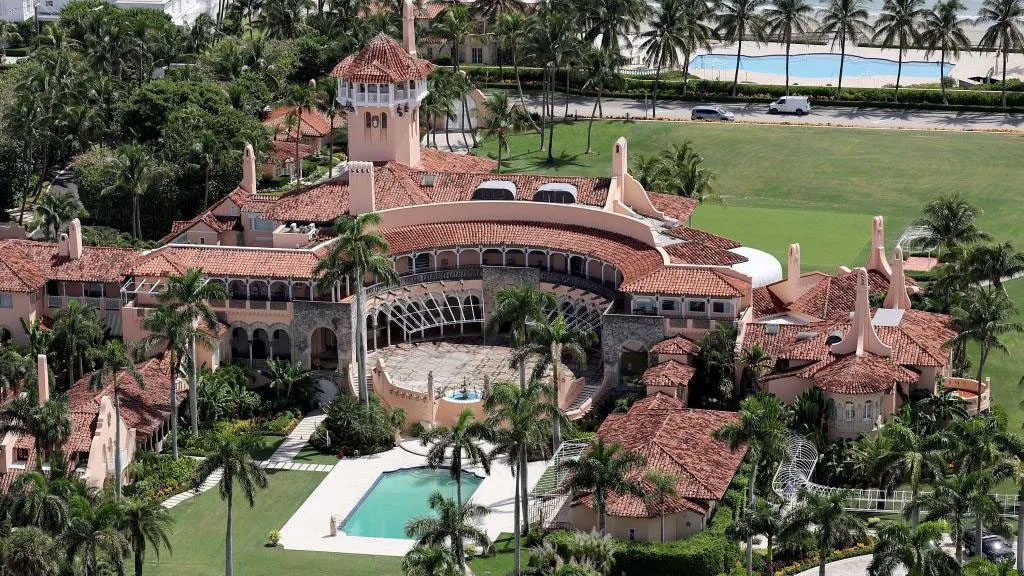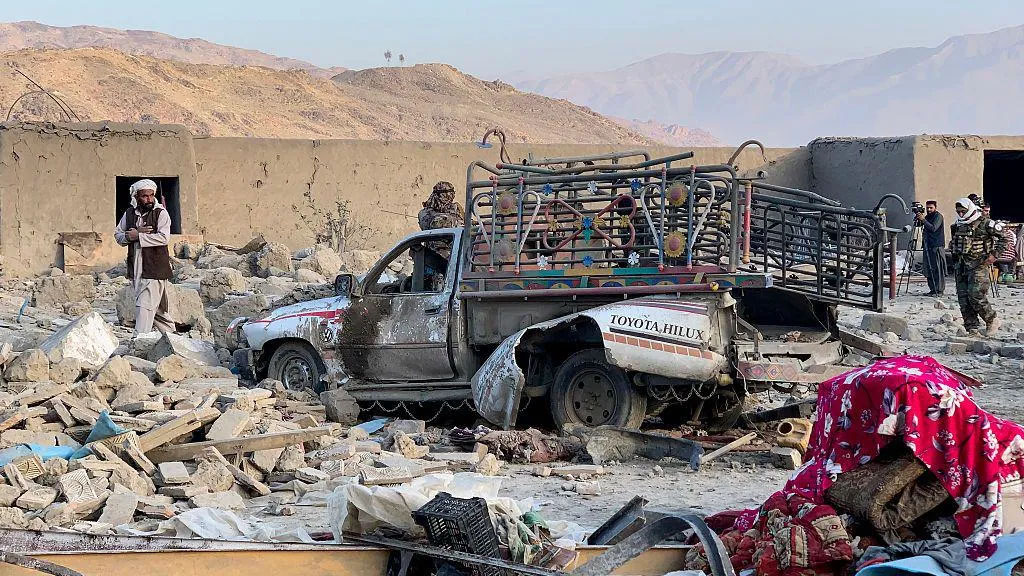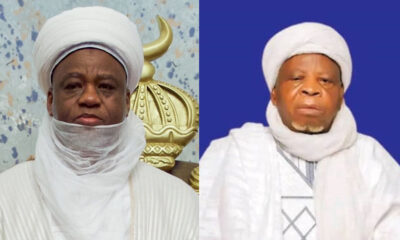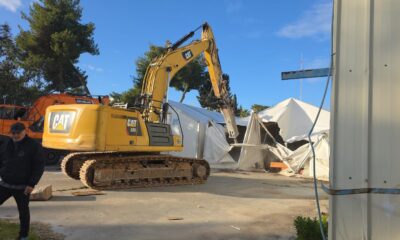International
Israel confirms bombing Hezbollah sites deep inside Lebanon

Israel confirms bombing Hezbollah sites deep inside Lebanon
The Israeli military says it carried out a series of strikes across Lebanon after blaming Hezbollah for Saturday’s deadly attack in the occupied Golan Heights, as its foreign ministry said the Lebanese group had crossed a “red line”, raising fears of regional escalation.
The Israeli military said on Sunday its jets bombed weapons depots and infrastructure belonging to Hezbollah in Bekaa Valley in eastern Lebanon, in Shabriha and Burj el-Shemali near the southern city of Tyre, and the villages of Kafr Lila or Kfar Kila, Rab el-Thalathine, Khiam and Tayr Harfa.
Israel’s Ministry of Foreign Affairs on Sunday blamed Hezbollah for the rocket attack on a football ground that killed 12 people.
“Saturday’s massacre constitutes the crossing of all red lines by Hezbollah. This is not an army fighting another army, rather it is a terrorist organisation deliberately shooting at civilians,” the ministry said in a statement.
Hezbollah has “categorically denied” responsibility for the attack. There have been unconfirmed claims that a failed Israeli interceptor missile may have caused the incident.
Iran, Hezbollah’s regional ally, warned Israel against any “new adventure concerning Lebanon” using the Majdal Shams incident as an “excuse”.
“After 10 months of mass killing in the Gaza Strip and mass murder of Palestinian children and women, the apartheid Israeli regime is trying to distract public opinion and global attention from its wide-ranging crimes in Palestine using a fabricated scenario,” Iranian Ministry of Foreign Affairs spokesman Nasser Kanaani said in a statement on Sunday, adding that Israel will be responsible for any moves that will further destabilise the region.
READ ALSO:
- LASG denies revoking existing building permits
- BREAKING : Kenneth Okonkwo exits Labour Party, parts ways with Peter Obi
- Paris 2024: Aruna, Omotayo crash out of men’s table tennis
United States Secretary of State Anthony Blinken said there was “every indication” that Hezbollah was behind the rocket strike, renewing Washington’s backing for “Israel’s right to defend its citizens from terrorist attacks”.
Speaking at a press conference in Tokyo alongside the US Defense Secretary Lloyd Austin on Sunday, he said the US does not want to see the conflict escalate following the Majdal Shams incident.
“We are determined to bring the Gaza conflict to a close. It’s gone on for far too long. It’s cost far too many lives. We want to see Israelis, we want to see Palestinians, we want to see Lebanese live free from the threat of conflict and violence,” Blinken said, adding that the US is maintaining contact with the Israeli government.
‘Tipping point’
Reporting from Beirut in Lebanon, Al Jazeera’s Zeina Khodr said the latest Israeli attacks were a message to Hezbollah, not the response it has promised.
“What we witnessed overnight was really normal activity, something that we have seen in the past 10 months since Hezbollah opened up a front in southern Lebanon to help the people of Gaza,” she said.
According to Khodr, the Israeli response and whether it would hit military or civilian targets could signal a “tipping point” that will determine the trajectory of the border conflict that started on October 8.
The Israeli security cabinet is expected to have a meeting later on Sunday to decide on a response to the rocket attack in Majdal Shams.
Israeli commanders meet Druze leaders
In a video message from the site of the attack on Sunday morning, Israeli military chief Herzi Halevi reiterated the claim that an Iranian-made Falaq rocket – which has been employed by Hezbollah since the start of border fighting last October – carrying a 53kg (116 pounds) warhead hit the football field.
“This is a Hezbollah rocket. And whoever fires such a rocket into an urban area wants to kill civilians, wants to kill children,” he said.
Halevi added that the Israeli military is “increasing our readiness for the next stage of fighting in the north” as it keeps attacking the Gaza Strip to deadly effect.
He and other commanders met Druze leaders and community members in the area.
The United Nations, the US and the European Union condemned the attack. The UN and the EU urged all parties to exercise “restraint” to prevent an all-out war, with the 27-member bloc’s foreign policy chief Josep Borrell calling for an “independent international investigation”.
More than 350 people, including about 100 civilians have been killed in repeated Israeli attacks on Lebanon since the start of the war on Gaza, according to the UN. Israeli officials say more than 30 people, including 10 civilians, have been killed in attacks originating from Lebanon.
Israel confirms bombing Hezbollah sites deep inside Lebanon
SOURCE: AL JAZEERA
International
US Adds 19 More Nigerians to ‘Worst of the Worst’ Deportation List

US Adds 19 More Nigerians to ‘Worst of the Worst’ Deportation List
The United States government has added 19 more Nigerian nationals to its “worst of the worst” criminal aliens list, bringing the total number of Nigerians scheduled for deportation to 113. The move targets convicted criminals who have served time in U.S. courts and are deemed a threat to public safety.
According to the U.S. Department of Homeland Security (DHS), the newly listed Nigerians were convicted of serious crimes, including sexual assault on a minor, fraud, assault, drug trafficking, and money laundering. These individuals were arrested by U.S. Immigration and Customs Enforcement (ICE) and will be deported after completing immigration procedures.
A DHS statement highlighted the purpose of the programme:
“The U.S. Department of Homeland Security is highlighting the worst of the worst criminal aliens arrested by U.S. Immigration and Customs Enforcement. Under Secretary Kristi Noem’s leadership, ICE is carrying out deportations — starting with the worst of the worst.”
READ ALSO:
- Gunmen Storm Gbugbu in Kwara, Residents Flee as Panic Spreads
- FG to Launch Monthly Revenue Transparency Dashboards to Improve Fiscal Accountability
- Troops Repel Coordinated Attacks in Borno, Kill 25 Terrorists, Soldier Dies
Among those newly added to the list are Adeolu Solabu, Oladayo Agboola, Chinonso Ochie, Oluchi Jennifer Chimdimma Chime, Samuel Omorodion, Sunday Adediora, Sunday Kunkushi, Mkpouto Etukudoh, as well as Marcus Unigwe, Kehinde James, Blessing Uchanma, Victor Adebisi, Richard Ugbah, Olaniyi Ojikutu, Oluwamuyiwa Olawoye, Okechukwu Amadi, Femi Jolayemi, Anthony Asanya, Izuchukwu Okoye, and Ebele Agbasiele.
This latest addition follows a previous announcement in which 79 Nigerian nationals had already been slated for deportation for offences ranging from fraud, manslaughter, assault, robbery, to drug-related crimes. The combined total of 113 Nigerians reflects the U.S. government’s intensified focus on criminal aliens.
The move has sparked renewed discussion about U.S. immigration enforcement, diplomatic engagement with Nigeria, and the rights and welfare of deportees. Advocates have raised concerns about ensuring due process and humane treatment for those returned to Nigeria, while authorities stress that deportation is a legal measure targeting foreign nationals convicted of serious crimes.
Globally, Nigerians have faced similar deportation measures, including large-scale removals from countries like India, where thousands were repatriated for visa violations or alleged criminal activities. The ongoing deportations underscore the challenges facing Nigerian citizens abroad amid tightened international immigration and law enforcement policies.
US Adds 19 More Nigerians to ‘Worst of the Worst’ Deportation List
International
Armed Man Shot Dead at Trump’s Mar‑a‑Lago Residence by Secret Service

Armed Man Shot Dead at Trump’s Mar‑a‑Lago Residence by Secret Service
An armed man was shot and killed early Sunday after breaching the secure perimeter of Donald Trump’s Mar‑a‑Lago residence in Palm Beach, Florida, the United States Secret Service confirmed. The incident occurred around 1:30 a.m. ET (06:30 GMT) while Trump and First Lady Melania Trump were in Washington, D.C.
Authorities said the suspect, later identified as Austin Tucker Martin, a 21-year-old from Cameron, North Carolina, was carrying a shotgun and a fuel canister when confronted by Secret Service agents and a Palm Beach County sheriff’s deputy. Officers ordered him to drop the items, but he raised the shotgun toward them, prompting them to fire and neutralise the threat. No law enforcement officers were injured in the incident. Martin’s family had reported him missing hours before the shooting. Moore County authorities said the missing-person report was turned over to federal investigators. Officials are examining whether he acquired the firearm during his drive from North Carolina to Florida. A box for the shotgun was later recovered from his vehicle.
READ ALSO:
- Women, Children Killed as Pakistan Launches Overnight Strikes on Afghanistan
- 2027 Elections: IPOB Vows to Resist APC Godfatherism in Abia
- FG Arraigns Abuja Pastor-Doctor Over Alleged ₦19m Fraud, Sale of Embryos
Palm Beach County Sheriff Ric Bradshaw described the encounter: the suspect dropped the fuel can but lifted the shotgun into a threatening position. “At that point, agents fired their weapons to neutralise the threat,” Bradshaw said. Officers involved were equipped with body cameras, which captured the incident. The FBI is leading the investigation with support from the Secret Service and local law enforcement. Officials are analyzing bodycam footage, gathering evidence, and creating a psychological profile of the suspect. Authorities have yet to determine a motive.
Mar‑a‑Lago is heavily guarded, with an outer cordon maintained by local Palm Beach deputies and an inner perimeter secured by the Secret Service. Visitors are screened, and vehicles and bags are checked with metal detectors and sniffer dogs. The shooting adds to a history of threats against Trump. In July 2024, Trump was grazed by a bullet at a rally in Butler, Pennsylvania, where one bystander was killed and two others injured. Another would-be assassin, Ryan Routh, attempted an attack at Trump International Golf Club in West Palm Beach and was recently sentenced to life in prison. Following the Mar‑a‑Lago shooting, Secret Service Director Sean Curran traveled to Florida to oversee “after-actions” and reinforce operational communication and response protocols.
Political violence has become a prominent topic in the US. Treasury Secretary Scott Bessent criticized what he described as “normalizing violence” in politics, referencing previous assassination attempts and recent high-profile attacks, including the public shooting of right-wing activist Charlie Kirk and the fatal shootings of a Democratic lawmaker and her husband in Minnesota. The FBI and Secret Service are continuing the investigation to determine the suspect’s motive and possible affiliations, with authorities pledging to release updates as more information becomes available.
Armed Man Shot Dead at Trump’s Mar‑a‑Lago Residence by Secret Service
International
Women, Children Killed as Pakistan Launches Overnight Strikes on Afghanistan

Women, Children Killed as Pakistan Launches Overnight Strikes on Afghanistan
Pakistan has carried out deadly overnight airstrikes on Afghanistan, killing at least 18 people, including women and children, according to the Afghan Taliban, in a major escalation of Pakistan–Afghanistan tensions along their volatile border.
Islamabad confirmed that the operation involved precision airstrikes against seven alleged militant camps and hideouts close to the Pakistan–Afghanistan border, saying the attacks were launched in retaliation for recent suicide bombings inside Pakistan. Pakistani officials said the strikes were intelligence-based and aimed at eliminating armed groups accused of orchestrating cross-border attacks.
The Taliban government in Afghanistan strongly condemned the strikes, accusing Pakistan of bombing civilian homes and a religious school. Afghan authorities described the attacks as a violation of national sovereignty and warned that continued military action could worsen regional instability.
According to Afghanistan’s defence ministry, the airstrikes hit civilian areas in Nangarhar and Paktika provinces. In Girdi Kas village in the Bihsud district of Nangarhar, residents said entire families were affected when homes were destroyed. Local Taliban officials said 18 members of one family were killed, while only a few survived. Earlier casualty estimates had placed the death toll at around 20 people, though figures were later revised.
READ ALSO:
- 2027 Elections: IPOB Vows to Resist APC Godfatherism in Abia
- FG Arraigns Abuja Pastor-Doctor Over Alleged ₦19m Fraud, Sale of Embryos
- Tinubu Hails Wike as APC Dominates 2026 FCT Area Council Elections
In Paktika province, strikes reportedly hit a guesthouse and a religious school in the Bermal and Urgun districts. Local officials said those facilities were empty at the time, and no deaths were reported there.
Pakistan’s Ministry of Information and Broadcasting said the military action involved “selective targeting” of fighters linked to the banned Tehreek-i-Taliban Pakistan (TTP), which Islamabad refers to as Fitna al Khawarij, as well as elements of the Islamic State-Khorasan Province. The ministry described the operation as a retributive response to terror attacks it said were planned from Afghan soil.
The latest escalation follows a series of deadly attacks in Pakistan, including a suicide bombing at a Shia mosque in Islamabad earlier this month and additional assaults in Khyber Pakhtunkhwa since the start of Ramadan. Pakistan accused the Afghan Taliban of failing to rein in militants, claiming it had conclusive evidence that some of the attacks were directed from across the border. Kabul has repeatedly denied allowing Afghan territory to be used against neighbouring countries.
In a strongly worded response, the Taliban’s defence ministry described the airstrikes as a “blatant violation of Afghanistan’s territorial integrity” and a “clear breach of international law.” It warned that an “appropriate and measured response” would be taken at a suitable time, accusing Pakistan of flawed intelligence for hitting civilian targets and religious institutions.
The strikes come despite a fragile ceasefire reached in October after deadly cross-border clashes, the worst since the Taliban returned to power in 2021. Although that truce reduced large-scale fighting, sporadic clashes and air operations have continued to strain relations.
Tensions had briefly eased earlier this week after Saudi Arabia mediated the release of three Pakistani soldiers captured during last year’s border clashes. However, analysts warn that the latest airstrikes could undermine diplomatic efforts, worsen humanitarian conditions in border communities, and heighten the risk of further retaliation.
Pakistan and Afghanistan share a 1,600-mile mountainous border, long plagued by militancy, smuggling, and recurring military confrontations, making it one of the region’s most unstable frontiers.
Women, Children Killed as Pakistan Launches Overnight Strikes on Afghanistan
-

 Business2 days ago
Business2 days agoDangote Opens Refinery Investment to Nigerians With Public Share Sale Plans
-

 Education2 days ago
Education2 days agoUTME: JAMB Clarifies Position on Hijab During Biometric Capture
-

 Politics1 day ago
Politics1 day agoTinubu Hails Wike as APC Dominates 2026 FCT Area Council Elections
-

 Entertainment1 day ago
Entertainment1 day agoRegina Daniels Takes Delivery of ₦150m 2026 GAC Trumpchi M8 SUV
-

 Politics2 days ago
Politics2 days agoADC Defeats APC to Win First Polling Unit in FCT Area Council Election
-

 Politics1 day ago
Politics1 day agoFCT Council polls: APC Wins Four Chairmanship Seats as PDP Takes Gwagwalada
-

 Politics2 days ago
Politics2 days agoOpposition Weakens as Another Governor Eyes APC Move
-

 News1 day ago
News1 day agoYoruba Muslim Group Dismisses Viral Ramadan Date Claim, Reaffirms Sultan of Sokoto’s Authority















